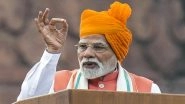Washington [US], July 31 (ANI): During a recent study, researchers found that children hold stereotypical views that 'brilliance' is a male trait, and this belief strengthens as they grow up to the age of twelve.
The study led by Nanyang Technological University, Singapore (NTU Singapore) in collaboration with New York University, was published in the scientific journal Child Development in May 2022. It involved 389 Chinese Singaporean parents and 342 of their children aged 8 to 12.
Also Read | Vice President M. Venkaiah Naidu Presented the Prestigious ‘President’s … – Latest Tweet by IANS India.
Tests were carried out to measure the extent to which parents and their children associate the notion of brilliance with men, and to probe the relationship between parents and their children's views.
The study defined brilliance as an exceptional level of intellectual ability and results showed that children are as likely to associate brilliance with men, as their parents are.
This belief was stronger among older children and stronger among those children whose parents held the same view.
While previous research on gender stereotypes has found the idea that giftedness is a male trait that can emerge at around the age of six, it was not known whether and how this stereotype changes over the course of childhood, until now.
Lead author of the study, Associate Professor Setoh Peipei from NTU Singapore's School of Social Sciences, said the Singapore-based study is the first to identify that the tendency to associate brilliance with men (also known as the 'brilliance equals to men' stereotype) increases in strength through the primary school years, and reaches the level of belief seen in adults by the age of 13.
"Stereotypical views about how boys are smarter than girls can take root in childhood and become a self-fulfilling prophecy," said Prof Setoh. "For girls, this may lead them to doubt their abilities, thus limiting their ideas about their interests and what they can achieve in life."
"Our research work shows parents must also be included in policies and school programs to effectively combat children's gender stereotypes from a young age," she added.
For example, as previous studies have found that parents use different explanation styles for daughters and for sons, the research team said programs to train parents and teachers to be mindful of balancing their behavior during interactions with children -- especially with girls -- could be introduced.
The authors say the study offers evidence to support Singapore's push to close the gender gap in the Science, Technology, Engineering, and Mathematics (STEM) sectors.
While Singapore has the second highest in the world OECD PISA scores in mathematics, science and reading, a recent study by the Promotion of Women in Engineering, Research, and Science (POWERS) program at NTU Singapore found that women in Singapore are less confident in their math and science abilities compared to men. Women are also more likely than men to perceive gender barriers to STEM career entry and career progress. (ANI)
(The above story is verified and authored by ANI staff, ANI is South Asia's leading multimedia news agency with over 100 bureaus in India, South Asia and across the globe. ANI brings the latest news on Politics and Current Affairs in India & around the World, Sports, Health, Fitness, Entertainment, & News. The views appearing in the above post do not reflect the opinions of LatestLY)













 Quickly
Quickly


